Do you suffer with stress in the workplace?
Workplace stress sadly is commonplace! In January 2020 Antonio Horta-Osorio (CEO of Lloyds Bank) announced : "Firms that ignore mental health issues risk breaking employees lives and families!".
By releasing the mental and physical tensions which become locked within the physical body tissues, Tim brings his 40+ years of experience to return the mind and body back to a healthy state.
The problem of workplace stress and tension.
A lack of wellbeing and the resultant increase of stress in the workplace, creates tension and problems amongst individuals. This results in poor team efficiency and effectiveness within departments or boardrooms.
We spend many hours a week at work. If the stress and tension or job stress and demand gets too high then it has significant consequences to the physiology.
Across a department, a team or within an entire organisation, when personnel wellbeing is poor, many key organisational performance factors can be affected, such as:
• reduced productivity
• increased mistakes and errors
• conflict (with colleagues and up-line/downline management/subordinates)
• grievance and disciplinary incidents
• sickness and absenteeism
• low morale and negative atmosphere
• poor customer services and quality
• resignations and job terminations (causing increased staff turnover)
• poor employer reputation among staff, customers, and potential new recruits
Aside from all this, wellbeing at work is synergistically linked to general wellbeing and health in life. When wellbeing is deteriorating, people can develop health issues – both mentally and physically.
Within the workplace, a variety of pressures exist:
• deadlines
• responsibilities
• task complexity
• challenges
• work relationships
• supervision
All these aspects seriously reduce our wellbeing, especially when we fail to recognise and deal effectively with the risks at an underlying level.
To quote ‘Business balls‘:
“Where workplace culture encourages a lot of competition and challenge among managers and staff, there can be a tolerance and acceptance of stress. Sometimes there is even a sense of bravado and pride in handling stress, where pressure is regarded to be motivational and thrilling. There is a fine line however between healthy motivation and unhealthy stress.
Understanding the risks to workers in relation to stress and wellbeing and knowing the best remedial action, is an increasingly important responsibility for the effective employer.”
Finding a unique and powerful solution
“No problem can be solved from the same level of consciousness that created it.”
- Albert Einstein
The solution has to come from a more profound level of knowledge!
In my many years as an osteopathic practitioner I saw the clinical consequences of increasing stress levels within individuals from workplace stress.
I noted how stress at work (or home life) gradually manifests in health issues both physically and mentally over the years if not attended to in a true manner – attending to the deep underlying issues, not just the surface symptoms. Medications can ease the problems of anxiety but the underlying situation if left to prevail only erupts within the individual later, causing more profound health issues or the need for stronger medications (with potentially stronger side effects).
Well-being and countering stress at work are part of the responsibility and ‘duty of care' that every good employer owes to its personnel. However, this topic extends way beyond our work-life, as well-being has broad implications for all aspects of our life – from home and family to friendships and overall levels of our contentment. The level of workplace stress can then affect our health both physically and mentally on many levels – even potentially how long we live, our level of health and happiness, whether we suffer anxiety and illness, or possible worse conditions.
Everyone in the workplace needs to encourage and enhance the culture of maintaining personal wellbeing at work. When personnel wellbeing is increased, or maintained at a high level, significant benefits will occur right throughout the whole organisation. If we look at the problem from an organisational management perspective, wellbeing is a major factor in quality, performance, productivity and therefore business effectiveness and profit.
Where a person's wellbeing reduces, so typically does his or her performance and effectiveness. Well-being is inversely related to levels of work-related stress as work stress increases so the health and wellbeing of personnel reduces.
If you or any of your work colleagues see that workplace stress is affecting you in any way, do give Tim a call to see how he can help.
The (U.K.) Health and Safety Executive (HSE) - alarming statistics from the HSE, absenteeism and the cost to the UK.
According to the HSE:
“Work related stress develops because a person is unable to cope with the demands being placed on them. Stress, including work related stress, can be a significant cause of illness and is known to be linked with high levels of sickness absence, staff turnover and other issues such as more errors.”
In 2004 the Management Standards were launched by the HSE, specifically to address issues of poor health, lowered productivity and increased sickness absence in the workplace. The standards offered guidelines on stress for employers, and highlighted six aspects which creates stress in the workplace. The standards were introduced to encourage good practice and raise awareness of how organisational/working methods and activities influence stress.
- Demands - such as workload and work environment.
- Control - a person's individual influence over how their job is carried out.
- Support - from the organisation; management and colleagues.
- Relationships - to reduce conflict and deal with unacceptable behaviour.
- Role - understanding of what the job entails; what is expected and needed.
- Change - how change is managed within the organisation.
How Stress affects your Health
Although the stress at work is usually of a mental nature the effects are felt on the body at a very physical level affecting our heart, lungs, digestion, metabolism, spine and joints
i) Mental issues – “Not tonight, I’ve got a headache!”
ii) Heart, Lungs and Circulation – “Why am I so tired?”
iii) The Skin – “You make me feel itchy and scratchy!”
iv) Metabolism and Digestion – “You make me feel sick!”
v) Muscles and Joints – “You are a pain in the butt!”
vi) Reproductive System – “We want a baby!”
vii) Immune System - “Who gave me that cold?”
Although the stress at work is usually of a mental nature (unless you have a purely very physically demanding job with no mental demands), the effects are felt on the body at a very physical level. Even conditions of the mind such as anxiety and depression are clinically palpable at a physical tissue level by an appropriately trained osteopathic practitioner.
Depending on our genetic tendencies we all have an area or areas of our physiology which negatively react to stresses. We are not all the same! Some people will get anxiety and stress migraines, whilst others may get high blood pressure, some develop stomach ulcers others irritable bowel syndrome, some people get arthritis whilst others get back pains. Stress can lead to these and many other illnesses and conditions. It is considered by many people in the medical fraternity that stress causes or heavily aggravates some 90% of all chronic medical conditions! This makes it very clear why stress is the major cause of absenteeism in the workplace, and consequently a highly expensive mark on the balance sheet!
Having members of the company personnel off work with chronic illnesses creates significant costs to the organisation. Absenteeism creates a knowledge base lack, when the individual is missing from the team, in addition to the lack of man/woman-power when moving a decision into effective concrete action.
Let’s look at just a few conditions that commonly arise:
The following diagrams from the HSE website highlight just some of the physical issues caused by stress. The site can be visited at: https://www.hse.gov.uk/stress/overview.htm
Mental tension or stress issues
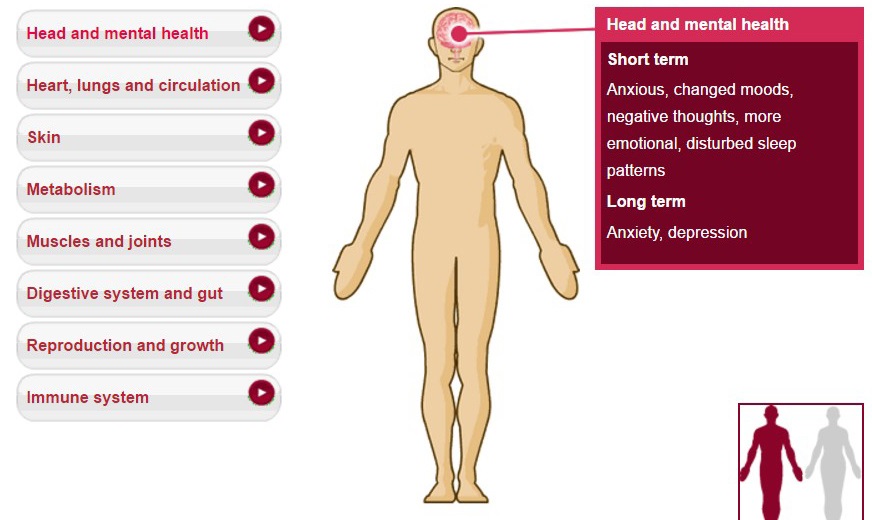
Anxiety states in the workplace states are almost at epidemic levels. Changes in how people work, the increased workload expectations, emails and social media coming at us 24/7 etc. etc. mean that we have difficulty from stopping thinking about work even when at home with family (resulting in increasing family stresses in the home). We are, in my opinion all under far more pressure in our work life than at any other time in history. The pace of life is far greater than even 30 years ago, when the internet and emails had not penetrated our work and home life. Anxiety when long term, leads to either burn out and chronic fatigue, or types of depression – we then can’t cope!
Heart, Lungs and Circulation
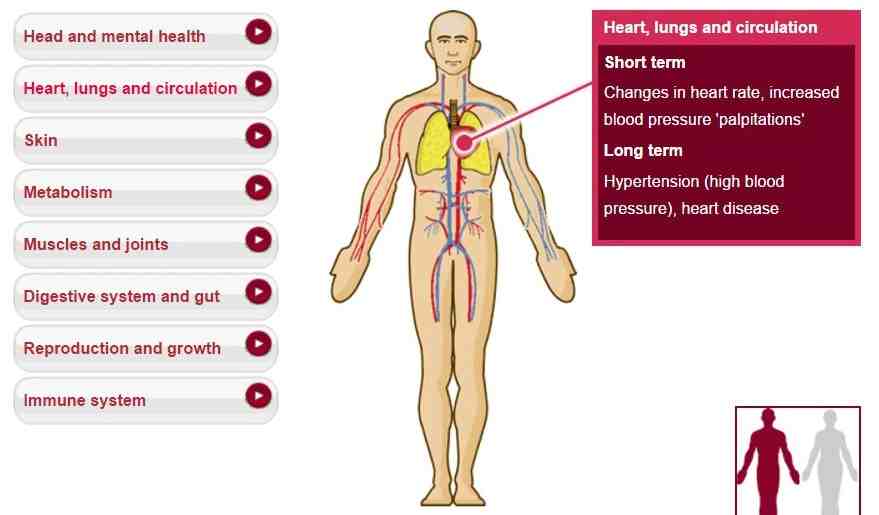
Under stress our heart must work harder.
This puts increased pressure on our blood vessels. Without corrective measures this continuing pressure on the lungs and circulation will lead to high blood pressure. Cholesterol levels can rise, furthering the effect of high blood pressure finally leading to consequent heart disease.
Taking anti -hypertensive medication does treat the symptoms but does not attend to the real underlying causes – stress at work or home life! Having powerful methods to combat stress in the workplace and at home is a powerful preventive treatment for circulation and heart problems.
.
The Skin
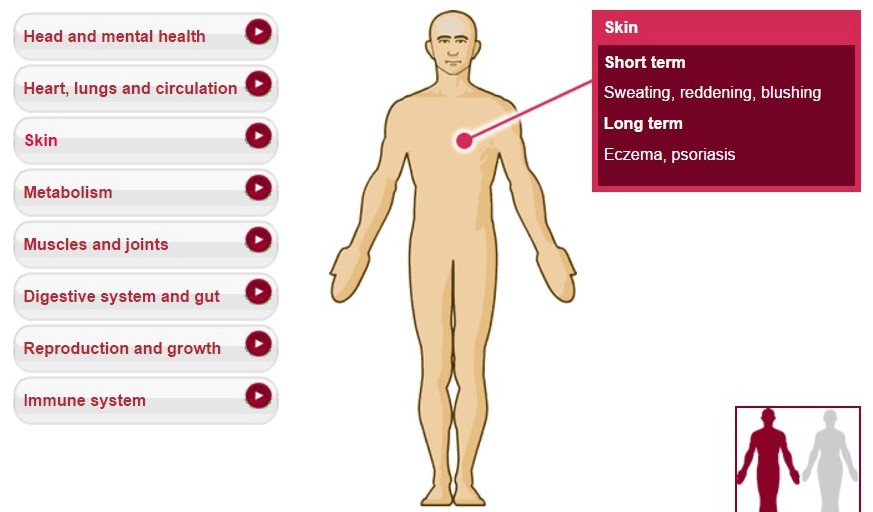
Your skin gets affected by stress too! Mental stress can cause skin problems such as psoriasis and eczema.
Our skin is a cousin of the nervous system and it is the largest organ of our body (by surface area)!
As a baby develops in the womb in the first few weeks of life, the nervous system and skin arise from the same underlying tissue (called the ectoderm). Only the skin and nervous system arise from this tissue type. Therefore, the skin may respond negatively to increasing stress levels as shown in the diagram..
Metabolic and Digestive System
 Our metabolism is what keeps the body ‘ticking over’ 24/7, digesting our food, supplying nutriment to the cells, metabolising energy resources within the body and coordination of the hormonal system.
Our metabolism is what keeps the body ‘ticking over’ 24/7, digesting our food, supplying nutriment to the cells, metabolising energy resources within the body and coordination of the hormonal system.
When the metabolism reduces in efficiency under stress our liver function drops, our digestion becomes impeded and our cells can suffer toxicity as the metabolites from our cells are not excreted as efficiently. Toxic states within the tissues leads to increased levels of irritation and inflammation and poorer function.
Conditions such as type two diabetes, stomach and duodenal ulcers, have stress as a known causative factor. However overweight individuals often have stress as an underlying cause of their condition.
Our metabolism and digestive system are both controlled by our autonomic nervous system. This comprises the Sympathetic Nervous System (SNS) and the Parasympathetic Nervous System (PSNS).
The SNS take the body physiology towards the Fight and Flight response. It reduces the blood flow to the non essential aspects of body function (those areas not needed immediately) and sends more blood flow to our muscles and brain so that we can act with full alertness, increasing our adrenalin and run away from the tiger. The act of running at high speed from a life threatening situation would burn up the tension in the muscles and neutralise the stress in the body during the subsequent relaxation as we rest after the exhausting exercise. However the modern day threat is not a tiger! We don't suddenly run 800 meters away from a colleague at work or a customer on the phone! Consequently the person can be left in a state of anxiety, feeling wound up and sometimes so stressed that they are not even aware of their stress levels (though others see it in them quite clearly)!
The PSNS has the effect of making us more chilled out. It sends more blood to the digestive system and dilates the blood vessels of the body. It increases during times of rest. When out of balance the PSNS can make us too lethargic, have chronic fatigue syndrome and get over tired or suffer with lassitude, poor focus at work and possibly have depressive tendencies.
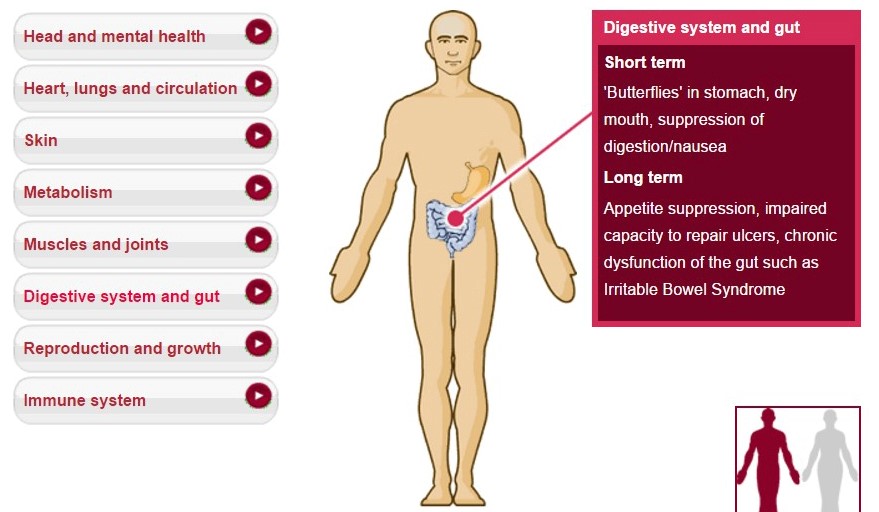 Workplace stress affects our digestion Digestive issues can be poor appetite, ulcers, irritable bowel syndrome
Workplace stress affects our digestion Digestive issues can be poor appetite, ulcers, irritable bowel syndrome
When under long term stress, the brain knows that a sense of heaviness in the digestion is settling to the mind. Therefore, unconscious of this underlying reason, many people immediately go for the ‘carbs’ when under stress – they go for cakes, biscuits, sweets, sweet tea or coffee (even cigarettes are sweet due to the nicotine) etc. to provide the sugar hit and sense of heaviness that ultimately develops (especially around the waist)!
Muscles
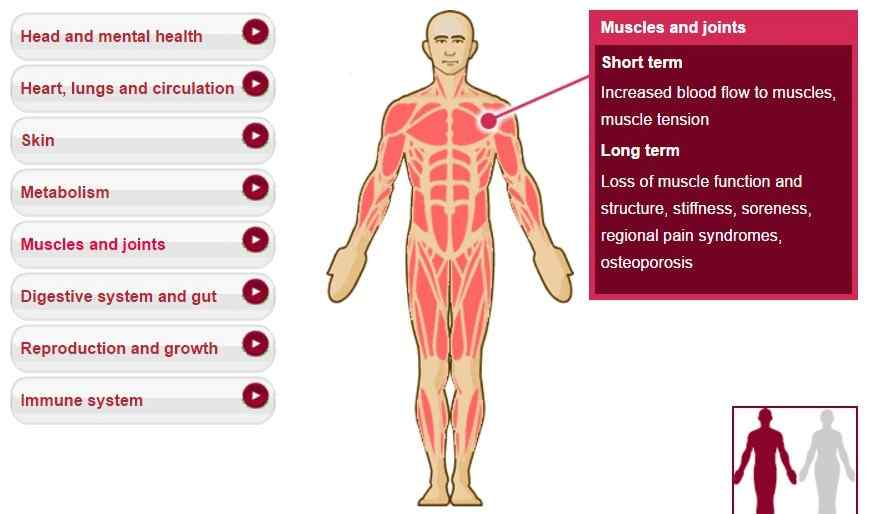 Muscles are easily affected by stress and tension at work Workplace stress and tension cause your muscles to tighten up and become sore and stiff
Muscles are easily affected by stress and tension at work Workplace stress and tension cause your muscles to tighten up and become sore and stiff
Our musculoskeletal system is very prone to the effects of mental stress.
When we get stressed our shoulders end up ‘around our ears’ as we hunch them up unknowingly. We get stiffness in our spine as the stress levels increase. A common area is the top of the neck which is frequently sore, tight and stiff. This often leads to stress headaches developing. Our spinal posture reflects our stress levels. (Module 3 of the Creative Dynamics programme attends specifically to this issue as this is a ‘time stress’ factor). Our large joints such as shoulder joints, hips, knees etc. end up having to work with greater muscle tension pushing the joint surfaces towards each other. This over the long term can lead to chronic pain and arthritis.
In my clinical experience, many arthritic patients also exhibit less mental flexibility – the mental stressed state expressing itself in the joints from chronic tight muscles, fascias and ligaments. Yoga teachers for thousands of years have acknowledged the intimate relationship between the mind and the musculoskeletal system, developing a system to help the mind by doing stretching postures for the body. Increased tensions in the musculoskeletal system can then subsequently negatively affect the other organ systems of the body. Further creating a detrimental level on our health.
Every action we do in life:
- go to work
- walk/ run
- sit/ type at a keyboard
- drive cars
- take part in sport or hobbies etc. etc.
All actions require our muscles and joints of the spine and limbs to work. We cannot escape the need for physical action. Stress developing in the musculoskeletal system has a profound effect on the quality of life. We don’t live to digest, we don’t live to circulate our blood, we don’t live to carry out chemical reactions in the liver. All these necessary activities of the body are there to support our musculoskeletal system to do the actions we choose to do in our own personal life. Things that give us or will bring us, fulfilment and happiness.
The Reproductive System
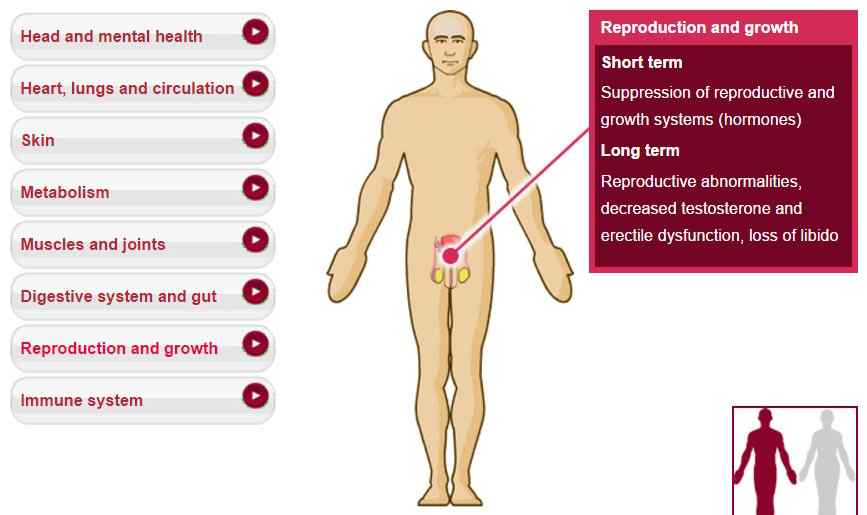 Stress and tension in the workplace can make having a baby more difficult When under stress and job tensions the reproductive organs function less well and the fertility reduces.
Stress and tension in the workplace can make having a baby more difficult When under stress and job tensions the reproductive organs function less well and the fertility reduces.
Stress affects the reproductive organs.
Due to the negative circulatory and hormonal changes that can result from stress, the reproductive system can be affected as shown in the diagram. Fertility – the chance of conceiving (when desired) are reduced when the individuals in the relationship are under a lot of stress. When we are under stress the hormones and reproductive organs (as much as any other body organs) operate less healthily, resulting in fertility and conception becoming less likely.
The Immune System
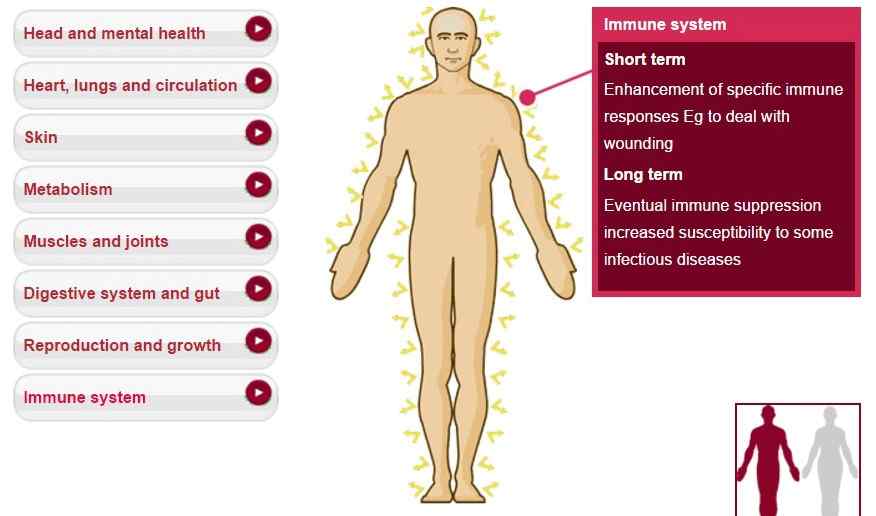 Stress makes the immune system weaker When the Immune system is weaker we are more prone to infections and our healing response gets slower
Stress makes the immune system weaker When the Immune system is weaker we are more prone to infections and our healing response gets slower
Any time you get a cold or the flu, before blaming others for having ‘given it to you’ think about your own life before the condition developed! Very frequently you will find that you had too many late nights, were not conscientious about your nutrition intake, were under a lot of stress at work, or home, not getting enough exercise etc. etc.
In other words, don’t ask yourself the question:
“Who gave me this cold/flu/ infection?”
When you should be asking yourself:
“What did I do to reduce my own natural immunity, such that I became susceptible to the infection?”
This is very often a very telling question and one which if you are honest to yourself will reveal the need to look after yourself better. Remember there have been many researches into the common cold, where a group of people were put into a room into which had been placed many ‘common cold’ – cachexia viruses. Not everyone in the room went down with the cold and there were varying levels of symptoms that resulted in different people. Some no symptoms, some just a mild sniffle, others the full-blown cold symptoms! The less stress in your system, the more you look after yourself in your work life balance, the better your nutrition (a poor diet is a form of stress), then your immune system is stronger, and you get infections less frequently than before.
Traditional methods of managing stress
According to Sean Young, traditional methods of managing stress in organisations and work are significantly lacking in true long term benefit. Costs to industry and employers in terms of mental ill-health at work (notably in absenteeism, staff turnover, and rehabilitation of staff off work long term) have continued to rise. There is now a definite need for a more powerful and very different approach to reduce stress in the workplace, not just tinker with easing symptoms, but a profound way to attend to the root causes within ourselves and those we work with.
